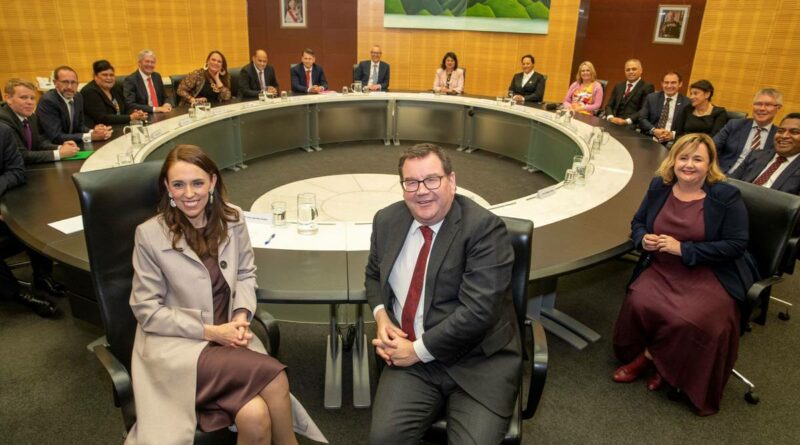Mike Munro: Govt will need to keep moving at pace to keep up with virus
OPINION:
There was a time before the deadly virus arrived when the arcane business of government always followed timeworn patterns.
For instance, Cabinet met at 11am on Mondays, aside from the few occasions each year when a statutory holiday would delay Cabinet’s weekly get-together until Tuesday.
About 40 Cabinet meetings a year was the norm.
Cabinet papers were drafted, sent around partner parties for consultation and then lodged at 10am on the Thursday before the meeting. Delays were commonplace because papers sometimes weren’t ready, or were still being consulted on.
And it was extremely rare for a public servant to be invited to join a Cabinet meeting. Aside from the Cabinet Secretary and the odd visiting head of state, nobody else gets to connect with ministers’ innermost circle.
But Covid-19 has been a game-changer in more ways than one. The unrelenting demands that management of the fast-changing pandemic crisis have thrown up have disrupted longstanding conventions.
From time immemorial the business of government has moved at a magisterial pace. Cabinet processes have always been slow, sometimes painfully so.
Now, in this time of crisis, speed is of the essence.
As urgent pandemic-related decisions have had to be taken, Cabinet papers have sometimes been drafted at the weekend, then lodged late on Sunday afternoon for consideration on Monday.
In addition, it has occasionally been necessary for ministers to get up-to-the-minute briefings from the director-general of health, Dr Ashley Bloomfield, as they consider those papers.
So the health supremo has found himself, at short notice, being beamed into ministers’ video-conferenced Cabinet discussions.
Other routines have had to be updated.
Since March 2020 the practice of the Monday Cabinet meeting being the final arbiter – at least in respect of pandemic-related decisions – has been set aside. The previous way of doing things simply lacked the flexibility to respond to urgent demands.
Soon after the virus hit our shores, ministers agreed to the formation of the Covid-19 Ministerial Group, or CMG, with “power to act” on pandemic-related matters.
Comprising eight senior ministers, including the PM and Deputy PM, it is effectively a second Cabinet, with the authority to take final decisions.
It was made clear from the outset that CMG wasn’t just another Cabinet committee. Given its critical role, the Cabinet Office rather than departmental officials has provided the secretariat support, receiving papers and generating its agendas.
And CMG doesn’t wait until the next Monday. It meets any day of the week, including at weekends.
The meetings-intensive schedule in 2021 saw the Cabinet and its mini version, the CMG, rack up 64 meetings, 13 of them on days other than Mondays.
As the PM has observed, there was no rulebook for a crisis of this kind. Her Cabinet has had to be quick-footed and had to learn to adapt.
CMG, like the full Cabinet, doesn’t rely solely on the officials’ advice, and for Ardern during the pandemic that has certainly been the case.
Mindful of the weight of responsibility resting on her shoulders to ensure the Government rises to the pandemic challenge, the PM seeks insights from a diverse range of sources.
She calls both Dr Bloomfield and the director of public health, Dr Caroline McElnay, to discuss matters around the control of the virus. The PM is also in regular contact with cabinet colleague Dr Ayesha Verrall, an Associate Minister of Health but also an infectious diseases doctor whose links into scientific and medical communities are invaluable.
The New Zealand Chief Science Adviser, Juliet Gerrard, is another key contact. Gerrard is plugged into the international science adviser network and so is able to give the PM useful perspectives.
By her own admission, the Prime Minister doesn’t bother poring over what the New Zealand media are saying about Covid-19 and other issues (there are staff to do that).
However, she does read international media coverage of the pandemic about three times a day, her main focus being the BBC website. It provides her with a better sense of where the global response is at.
More specifically, the PM keeps an eye on how Australia and Denmark, in particular, are handling the crisis. She has friends in those countries with whom she liaises regularly. And Darren Hughes, the former Labour MP now living in London, provides her with insights into Britain’s pandemic experience.
The Department of Prime Minister and Cabinet furnishes her with copies of the Science Weekly, which summarises the latest Covid-19 research and data that is produced by the Royal Society’s Science Media Centre. The PM apparently regards it as essential reading.
Ensuring that decisions are evidence-based includes keeping in close contact with business and community leaders. Opposition claims that the Government cares little about Kiwi businesses are illusory.
There is regular Government dialogue with business leaders, conducted mainly through Finance Minister Grant Robertson, but Ardern too has joined sessions with groups that have included Michael Barnett, the Auckland Chamber of Commerce head.
The PM also talks directly to the likes of Business New Zealand CEO Kirk Hope, other chamber leaders and mayors, so that she better understands the pressures and hardships that are being experienced.
This consultation has been essential given the bewildering pace of policy development and decision-making in response to the virus’ spread. The speed of events and loss of liberties have understandably caused dismay.
Attorney-General David Parker noted in a recent speech that legal changes that Parliament has made, and their constitutional consequences, has seen the Government “move quickly and into areas seldom seen in peacetime”.
As 2022 begins and the Omicron variant surfaces, the Government will have to continue being fleet of foot – even if it means a few more norms going out the window.
Source: Read Full Article


/cloudfront-ap-southeast-2.images.arcpublishing.com/nzme/U5GBVBB5U56VSAUKWXFVYPQAN4.jpg)
